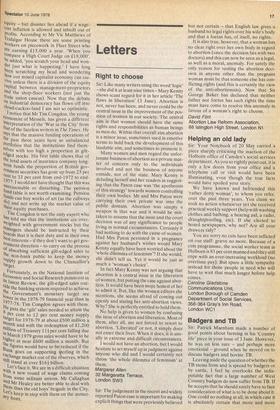Right to choose
Sir: Like many writers using the word 'logic' —she did it at least nine times— Mary Kenny shows scant regard for it in her article 'The flaws in liberation' (3 June). Abortion is not, never has been, and never could be the central issue in the improvement of the position of women in our society. The central aim is that women should have the same rights and responsibilities as human beings as men do. Within that overall aim abortion is a minor issue, sometimes used in emotive terms to hold back the development of this laudable aim, and sometimes to promote it.
Many women and men regard the unfortunate business of abortion as a private matter of concern only to the individuals involved and not the business of anyone outside, nor of the state. Mary Kenny is deluding herself and her readers in suggesting that the Paton case was 'the apotheosis of this strategy' towards women controlling their own bodies. Mr and Mrs Paton were carrying their own private war into the public domain. Abortion was simply a weapon in that war and it would be mistaken to assume that the issue and the court decision was of any significance to people living in normal circumstances. Certainly it had nothing to do with the cause of women. Had Mrs Paton persisted in a pregnancy against her husband's wishes would Mary Kenny equally have been worried about the 'whole dilemma of feminism'? If she would, she didn't tell us. Yet it would be just as much a 'woman's choice'.
In fact Mary Kenny was not arguing that abortion is a central issue in the liberation of women, but putting the case against abortion. It would have been more honest of her to admit it. But, like the women editors she mentions, she seems afraid of coming out openly and stating her anti-abortion views. Why? She is perfectly entitled to hold them.
No help is given to women by confusing the issue of abortion and liberation. Most of them, after all, are not forced to resort to abortion. 'Liberated' or not, it simply does not enter their lives. When it does, it is usually in extreme and difficult circumstances.
I would not have an abortion, but I would hesitate to set myself up in judgment against anyone who did and I would certainly not throw 'the whole dilemma of feminism' at them.
Margaret Allen 32 Margaretta Terrace, London SW3 Sir: The judgement in the recent and widely reported Paton case is important for making explicit things that were previously believed but not certain — that English law gives a husband no legal rights over his wife's body and that a foetus has, of itself, no rights.
It is also true, however, that a woman has no clear right over her own body in regard to abortion (since the decision lies with two doctors) and this can now be seen as a legal, as well as a moral, anomaly. For surely the only reason for vesting the abortion decision in anyone other than the pregnant woman must be that someone else has conflicting rights (and this is certainly the view of the anti-abortionists). Now that Sir George Baker has declared that neither father nor foetus has such rights the time must have come to resolve this anomaly in favour of a woman's right to choose.
David Flint Abortion Law Reform Association, 88 Islington High Street, London Ni


































 Previous page
Previous page